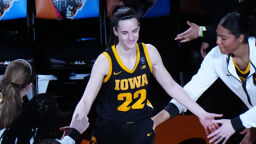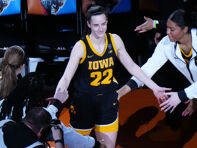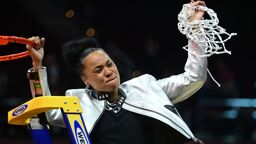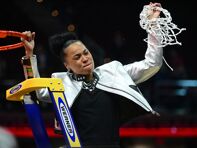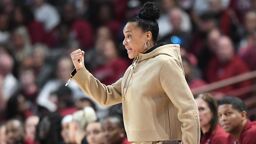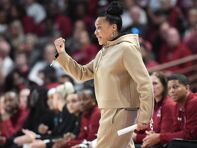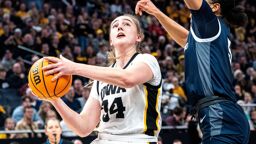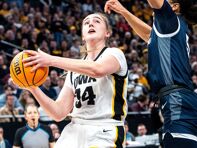For many former LGBTQ athletes and those now molding their athletic careers, National Coming Out Day on Oct. 11 does not often prompt a positive flashback to the day they chose to share with the world one of the most personal, intimate details about themselves. A glimpse into the competitive world of collegiate sports reveals a jarring truth: many athletes are outed, discouraged from coming out or both.
The latter was true for my experience on the women’s basketball team at Pepperdine University, resulting in conflicting emotions that I had not prepared to process and the chilling uncertainty left for me to answer: “Am I accepted here?”
I looked for signals of approval from the individuals who are regarded highest by an athlete. I searched for a sign of validation from my coaches that LGBTQ athletes were welcome. Visibility of a coach, staff member or anyone who was out in the athletic department would encourage me that one could simultaneously be successful and open about their orientation within their athletic profession.
Fears continually raced through my mind, many that provide justification for keeping athletes in the closet today. Did publicizing my orientation reflect a greater commitment to myself than my team? Many of my teammates held hands with their boyfriends and my coach had introduced his wife and kids to the team. For those in heterosexual relationships, their orientation is implied and unspoken. Why did my orientation require a “coming out”?
I now recognize that my questions back then were more critical of myself rather than of the environment at Pepperdine, which was rejecting my self-expression and excluding my identity from the conversation.
“Locker room talk” continues to consist of harmful and homophobic language affecting queer athletes and allies.
We have progressed as a society to recognize and refrain from using racially derogatory and offensive language. However, “locker room talk” continues to consist of harmful and homophobic language affecting queer athletes and allies. Why is this rhetoric normalized in sports? Perhaps because there is neither accountability for the offender nor visibility of the victim behind locker room doors.
Time is up. Let them know that you are there — queer or ally — because there is great hope that the culture of locker room talk is changing to an environment where accountability exists and queer athletes belong.
On Oct. 11, the University of Southern California will stand in solidarity with its LGBTQ athletes on National Coming Out Day by hosting “Out In Sports,” a day of events committed to them, for them and from them.
I felt this unique fighting spirit as soon as I stepped on the USC campus.
My first visit was to the LGBT Resource Center with its newly appointed Director Kelby Harrison — an instrumental figure in encouraging my partner, Layana White, and I to continue our education. To this day, she continues to serve as a mentor for all students who walk through the doors of the center, which has already seen a remarkable 30% increase in students from last year.
Most of all, Dr. Harrison understands the importance of bridging the gap between the university and athletics to create a bonded community that can more effectively respond to each other’s needs. On Oct. 11, Dr. Harrison will lead Ally Training for USC faculty and athletes.
Welcoming Layana and I, hand-in-hand, USC provided an education that has shaped our experience and will impact our careers for the rest of our lives. By the time we walked across the stage at graduation, it felt like we had been students for an entire four years.
Transferring from a university whose culture suppressed same-sex relationships emboldened us to embrace ours, and the result exceeded our expectations tenfold. At USC, when we built genuine, professional relationships with our professors who wanted to get to know us and offered support that propelled us to academic success.
What once was a personal and intimate detail about me became normalized, cherished and respected. I was continually encouraged by my professors in my pursuit for advocacy and fight for equality, and my hope to contribute to USC Athletics before I left soon became realized.
An office visit to meet Dr. Ange-Marie Hancock Alfaro, Dean’s Professor and Chair of USC’s Gender & Sexuality Studies, sparked a deeper conversation of how USC can raise a collective awareness for its LGBTQ athletes.
Within months, local leaders of the movement gathered in a USC conference room to plan “Out In Sports” — a collaborative effort by LA84 Foundation, ONE National Gay & Lesbian Archives, USC LGBT Resource Center, USC Annenberg Institute of Sports, Media & Society, USC Center for Feminist Research and executive producer of AT&T’s “Alone In The Game” David McFarland.
This is an event where, outside of attending a football game or sporting event, the USC community can come together — whether professors, students, athletes, or fans — and gain insight on how to facilitate greater integration between the world we see and that of LGBTQ athletes.
To eliminate obstacles that queer athletes often face on their path to success, it is integral that the community hears from them.
USC has invited panelists to discuss the mental health needs of LGBTQ athletes featuring Dr. Alise Cogger, former collegiate tennis player and current psychologist; Dave Salo, head coach of USC Men’s and Women’s swimming and a strong ally; Sam Lewis, USA and USC men’s volleyball player and openly gay man of color, and Layana White, former collegiate basketball player, USC alum and my partner.
The evening will commence with the campus-premier of “Alone In The Game,” a groundbreaking film that reveals how a new generation of queer and transgender athletes from high school to professional levels are scoring victories on and off the field by standing up for their rights and demanding a chance to compete.
We hope to see a huge turnout, but we also hope to inspire athletes to be confident in both their identity and voices.
For any closeted LGBTQ athlete, I also once was in your position. My biggest regret is not being able to finish the last three years of my college career while embracing who I was and who I loved.
For those nation’s most elite athletes that have this opportunity at USC, this National Coming Out Day presents an opportunity for you to own your story. You may just find that living fearlessly can take your game to the next level.
Haley Videckis is a graduate of USC in Political Science and played college basketball at Arizona State and Pepperdine. She is beginning her career as a writer while building a platform in entertainment and media to campaign for social justice issues. Her fiancée, Layana White, is also a graduate of USC in Political Science and played college basketball at the University of Arizona and Pepperdine. Layana is preparing for law school where she aspires to make policy changes as a civil rights attorney.
Videckis can be reached at [email protected] or on Instagram, Twitter or Facebook (HaleyVideckis). White can be reached on Instagram.







